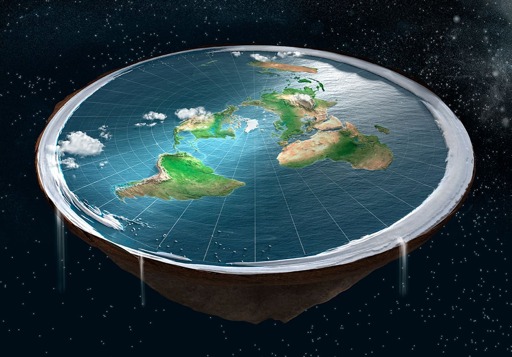The idea that the Earth is a sphere was all but settled by ancient Greek philosophers such as Aristotle (384–322 BC), who obtained empirical evidence after travelling to Egypt and seeing new constellations of stars. Eratosthenes, in the third century BC, became the first person to calculate the circumference of the Earth. Islamic scholars made further advanced measurements from about the 9th century AD onwards, while European navigators circled the Earth in the 16th century. Images from space were final proof, if any were needed.
Today’s flat-Earth believers are not, though, the first to doubt what seems unquestionable. The notion of a flat Earth initially resurfaced in the 1800s as a backlash to scientific progress, especially among those who wished to return to biblical literalism. Perhaps the most famous proponent was the British writer Samuel Rowbotham (1816–1884). He proposed the Earth is a flat immovable disc, centred at the North Pole, with Antarctica replaced by an ice wall at the disc’s outer boundary.
The International Flat Earth Research Society, which was set up in 1956 by Samuel Shenton, a signwriter living in Dover, UK, was regarded by many people as merely a symbol of British eccentricity – amusing and of little consequence. But in the early 2000s, with the Internet now a well-established vehicle for off-beat views, the idea began to bubble up again, mostly in the US. Discussions sprouted in online forums, the Flat Earth Society was relaunched in October 2009 and the annual flat-Earth conference began in earnest.



I thought it’d be pretty clear I’m an empiricist when it comes to epistemology. Solipsism is intensely unuseful. Why do you ask?
Well you said belief is bad, so drag assumed you believed nothing.
Two problems with that comment there. Firstly, solipsism isn’t belief in nothing so the outcome of your assumption is ill informed. The second, and pretty glaringly huge problem is that I didn’t actually say that, or anything like it. Be honest, now…are you honestly engaging in good faith? Hmmm? Maybe you’ve just mistaken me for someone else.
Yes, drag mistook you for Lib.
Hehe well that’s what I get for jumping in I suppose!
Drag still believes there must be a force of attraction between massive objects, even if Newton and Einstein got the equation wrong.
There is a force of attraction between any two masses. The equation is F=GMm/r^2. That one is good enough for nearly all practical applications, but Einstein’s field equations are better if you’re doing cosmology.
Do you think there is a better equation than those? You seem to imply that they’re wrong.
Drag has decided not to discuss the quantum gravity problem, and just reassert that drag is a gravity believer.
You have a weird way of talking. For example, it’s not normal to call Newton and Einstein “wrong” in their equations about gravity just because they did not happen to solve all of physics while writing them down…
at a certain point the question isn’t whether a formula is “right or wrong”, it’s about whether what the formula says is “good enough in this situation” or whether a different formula should be chosen.
This is an important topic in physics: choose the right frame of reference, the right simplifications, the right assumptions, … for your calculations to be as easy as possible, yet meaningful.
So i guess to “believe” in a formula is just to recognize and accept its usefulness for a purpose.
deleted by creator
deleted by creator
deleted by creator